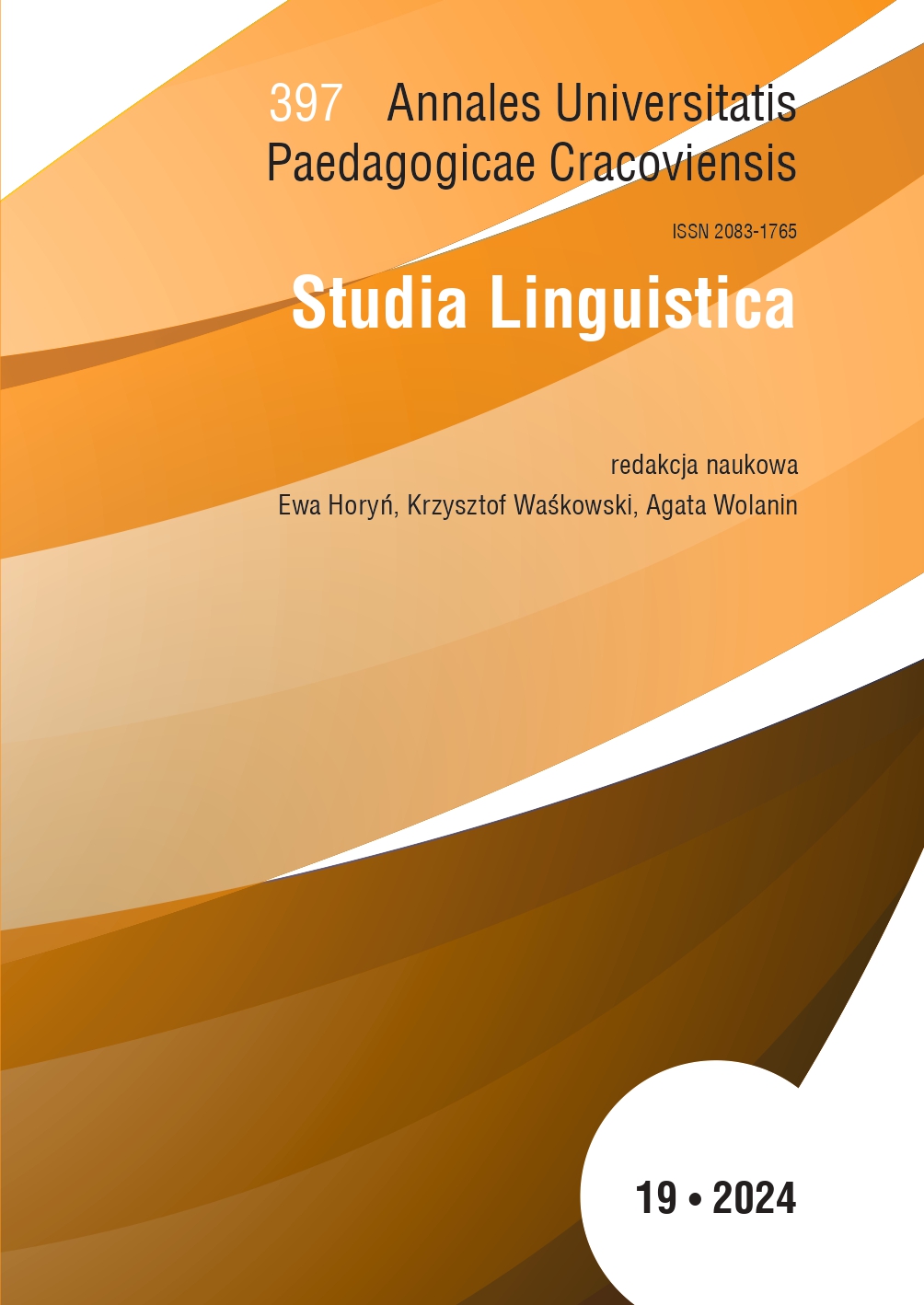Literature as a source of phraseology. Literaturism and its types in the Polish language
Main Article Content
Abstract
The main aim of the article is to direct the reader’s attention to the marginal nature of the research in phraseology derived from broadly conceived literary works. Heretofore phraseological combinations drawn from literature have not received comprehensive and in-depth linguistic treatment – there are no major theoretical and material-based works of research devoted to this subject which would enable one to present the richness and the variety of such lexical forms featured in the modern Polish language. Due to the fact that the Polish linguistic literature lacks a separate name of lexical combinations derived from literature, the author introduces the term literaturism (a literature-based expression – Polish: literaturyzm), by analogy with the terms biblizm and mitologizm which have been used in Polish linguistic studies for many years, and she also distinguishes particular types of literaturisms, i.e. phraseological literaturism (e.g. czekać na Godota, chocholi taniec, lwia część, rząd dusz, wiek balzakowski) and lexical literaturism (e.g. dulcynea, dulszczyzna, hamletyzm, judym, quasimodo).
Downloads
Article Details

This work is licensed under a Creative Commons Attribution-NonCommercial-NoDerivatives 4.0 International License.
Author, submitting a text to the editorial board of the journal “Annales Universitatis Paedagogicae Cracoviensis. Studia Linguistica", certifies that the content of the article has not been published so far and that the work does not violate in any way the copyright or related rights of other person, as well as other rights of third parties, and that no one's rights to the work (or any part thereof) have been missed. After signing the contract, the property rights to the published materials are transferred to the Scientific Publisher of the University of the National Education Commission, Krakow.
“Annales Universitatis Paedagogicae Cracoviensis. Studia Linguistica” is an open access journal, and all its content is made available free of charge to users and institutions under the Creative Commons CC-BY-NC-ND 4.0 license (attribution, non-commercial use, no derivative works). Under this license, the authors agree that their work may be lawfully reused for any purpose, except for commercial purposes, without the prior consent of the author or publisher. Everyone can read, download, copy, print, distribute and process these works, provided that the author's marking and the original publication place are correct. Published texts may not be used to create derivative works (e.g. to translate and publish in another language without the consent of the publisher). This is in line with the BOAI (Budapest Open Access Initiative) definition. "Studia Linguistica" does not charge for submitting or processing articles.
References
Rozwiązanie skrótów
Google Scholar
EJP – Encyklopedia języka polskiego, red. S. Urbańczyk, M. Kucała, Wrocław–Warszawa–Kraków 1999.
Google Scholar
MSB – Godyń J., Od Adama i Ewy zaczynać. Mały słownik biblizmów języka polskiego, Warszawa 2006.
Google Scholar
MSMF – Puda‑Blokesz M., Po nitce do kłębka. Mały słownik mitologizmów frazeologicznych języka polskiego, Kraków 2015.
Google Scholar
NKPP – Nowa księga przysłów i wyrażeń przysłowiowych polskich, t. I–III red. J. Krzyżanowski, t. IV opracował S. Świrko przy współudziale D. Świerczyńskiej i S. Świrko, Warszawa 1969–1978.
Google Scholar
PPBys – Bystroń J., Przysłowia polskie, Kraków 1933.
Google Scholar
PPDar – Weryha‑Darowski A., Przysłowia polskie odnoszące się do nazwisk szlacheckich i miejscowości, Poznań 1874, https://polona.pl/item-view/7c3c72ff-4260-4365- b336-bd863ca35f5b?page=59 (dostęp: 10.09.2023).
Google Scholar
PPRys – Rysiński S., Przypowieści polskie (Proverbiorum polonicorum centuriae decem et octo), Lubcz 1618, https://www.dbc.wroc.pl/dlibra/publication/26159/edition/
Google Scholar
/content (dostęp: 30.09.2023).
Google Scholar
SE – Kopaliński W., Słownik eponimów, czyli wyrazów odimiennych, Warszawa 1996.
Google Scholar
SFE – Czeszewski M., Foremniak K., Ludzie i miejsca w języku. Słownik frazeologizmów eponimicznych, red. M. Bańko, przedmowa R. Sulima, Warszawa 2011.
Google Scholar
SFWP – Bąba S., Liberek J., Słownik frazeologiczny współczesnej polszczyzny, Warszawa 2001.
Google Scholar
SLF – Piela A., Literatura źródłem związków frazeologicznych. Słownik, Katowice 2024.
Google Scholar
USJP – Uniwersalny słownik języka polskiego, red. S. Dubisz, t. I–IV, Warszawa 2003.
Google Scholar
WSF – Fliciński P., Wielki słownik frazeologiczny, Poznań 2012, https://repozytorium.amu.edu.pl/bitstream/10593/25561/1/Piotr%20Flici%C5%84ski_Wspolczesny_slownik_frazeologiczny_author%27s%20version.pdf (dostęp: 15.09.2023).
Google Scholar
WSFJP-1 – Müldner‑Nieckowski P., Wielki słownik frazeologiczny języka polskiego. Wyrażenia, zwroty, frazy, Warszawa 2004.
Google Scholar
WSFJP – Müldner‑Nieckowski P., Müldner‑Nieckowski Ł., Wielki słownik frazeologiczny języka polskiego. Pomoc dla piszących, Warszawa 2022.
Google Scholar
WSJP PAN – Wielki słownik języka polskiego PAN, red. P. Żmigrodzki, Kraków 2007–,
Google Scholar
http://www.wsjp.pl (dostęp: 30.09.2023).
Google Scholar
Bibliografia
Google Scholar
Chlebda W., 2001, Frazeologia polska minionego wieku, [w:] Polszczyzna XX wieku. Ewolucja i perspektywy rozwoju, red. S. Dubisz, S. Gajda, Warszawa 2001, s. 155–165.
Google Scholar
Chlebda W., 2005, Szkice o skrzydlatych słowach. Interpretacje lingwistyczne, Opole.
Google Scholar
Dereń B., 2005, Pochodne nazw własnych w słowniku i w tekście, Opole.
Google Scholar
Koziara S., 2001, Frazeologia biblijna w języku polskim, Kraków.
Google Scholar
Koziara S., 2005, Uwagi w sprawie źródeł oraz selekcji zasobu polskich frazeologizmów biblijnych, „Problemy Frazeologii Europejskiej” VII, s. 39–49.
Google Scholar
Lewicki A.M., Pajdzińska A., 2001, Frazeologia, [w:] Współczesny język polski, red. J. Bartmiński, Lublin, s. 315–333.
Google Scholar
Puda‑Blokesz M., 2014, Mitologizmy frazeologiczne w języku polskim (na materiale leksykografii XX i XXI wieku), Kraków.
Google Scholar
Puda‑Blokesz M., 2021, Mitologizmy frazeologiczne w najnowszych ujęciach lingwistycznych, [w:] Język polski – między tradycją a współczesnością. Księga jubileuszowa z okazji stulecia Towarzystwa Miłośników Języka Polskiego, red. E. Horyń, E. Młynarczyk, P. Żmigrodzki, Kraków, s. 150–161.
Google Scholar
Rudnicka E., 2005, Z pogranicza leksykologii i onomastyki – przyczynek terminologiczny, „Prace Filologiczne” L, s. 99–124.
Google Scholar
Rutkowski M., 2007, Nazwy własne w strukturze metafory i metonimii. Proces deonimizacji, Olsztyn.
Google Scholar
